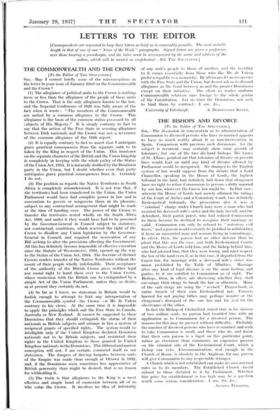THE COMMONWEALTH AND THE CROWN [To the Editor of THE
SPECTATOR.]
LETTERS TO THE EDITOR
[Correspondents are requested to keep their letters as brief as is reasonably possible. The most suihthle length is that of one of our " News of the Week" paragraphs. Signed letters are given a preference over those bearing a pseudonym, and the latter must be accompanied by the name and address of the
author, which be treated as confidential.—Ed. SrmcTATOn.]
SIR,—May I correct briefly some of the misconceptions in the letter in your issue of January 22nd on the Commonwealth and the Crown ?
(1) The allegiance of political units to the Crown is nothing more or less than the allegiance of the people of these units to the Crown. That is the only allegiance known to the law, and the Imperial Conference of 1926 was fully aware of the fact when it wrote : " The members of the Commonwealth are united by a common allegiance to the Crown. This allegiance is the basis of the common status possessed by all subjects of His Majesty." It is simply contrary to fact to say that the action of the Free State in severing allegiance between Irish nationals and the Crown was not a severance of the common allegiance of the 1926 report.
(2) It is equally contrary to fact to assert that I anticipate grave practical consequences from the separate oath to be taken by the King in respect of the Union. This insistence on the separate character of the British and the Union kingship is completely in keeping with the whole policy of the Status of the Union Act, 1934. It is naturally disliked by the Dominion party in the Union, but I doubt whether even that party anticipates grave practical consequences from it. Certainly I do not.
(3) The position as regards the Native Territories in South Africa is completely misunderstood. It is not true that, if the territories had been transferred to the Union, the Union Parliament would have had complete power in law and in convention to govern or misgovern them at its pleasure, subject to any contractual arrangement that might be made at the time of handing over. The power of the Crown to transfer the territories rested wholly on the South Africa Act, 1909, and under it they would have had to be governed by the Governor-General in Council subject to statutory, not contractual, conditions, which reserved the right of the Crown to disallow any Union legislation by the Governor- General in Council, and required the reservation of any Bill seeking to alter the provisions affecting the Government. All this has definitely become impossible of effective execution since the Statute of Westminster, 1931, opened up the way to the Status of the Union Act, 1934. The doctrine of distinct Crowns renders transfer of the Native Territories without the assent of their people wholly indefensible. Their acceptance of the, authority of the British Crown gives neither legal nor moral. right to hand them over to the Union Crown, whose connexion with the British can be extinguished by a simple Act of the Union Parliament, unless they so desire, as at present they certainly do not.
(4) So far as I know, no statesman in Britain would be foolish enough to attempt to foist any interpretation of the Commonwealth symbol—the Crown—cn Mr. de Valera contrary to his views. At the same time it is impossible to apply the principles which suit the Free State to Canada, Australia or New Zealand. It cannot be suggested to these Dominions that they should extinguish the status of their nationals as British subjects and arrange in lieu a system of reciprocal grants of specified rights. The system would be intelligible only if the United Kingdom declared Dominion nationals not to be British subjects, and restricted their rights in the United Kingdom to those granted to United Kingdom nationals in the Dominions. This illiberal and narrow conception will not, I am certain, commend itself to our statesmen. The dangers of driving bargains between units of the Empire was made clear enough at Ottawa in 1932, and, if the Dominions seem sometimes less appreciative of British. generosity than might be desired, that is no reason for withholding it.
(5) The truth is that allegiance to the King is a most effective and simple bond of connexion between all of us who value the Crown. It involves no idea of inferiority of any unit's people to those of another. and the hostility to it comes essentially from those who like Mr. de Valera prefer a republic to a monarchy. By all means let us co-operate with the Free State and the Union, but do not ask us to discard allegiance as the bond between us and the greater Dominions except on their initiative. The effort to render uniform Commonwealth relations runs foreign to the whole genius of the Constitution. Let us trust the Dominions, not seek. to bind them by contract.--I am, &e.,






















































 Previous page
Previous page